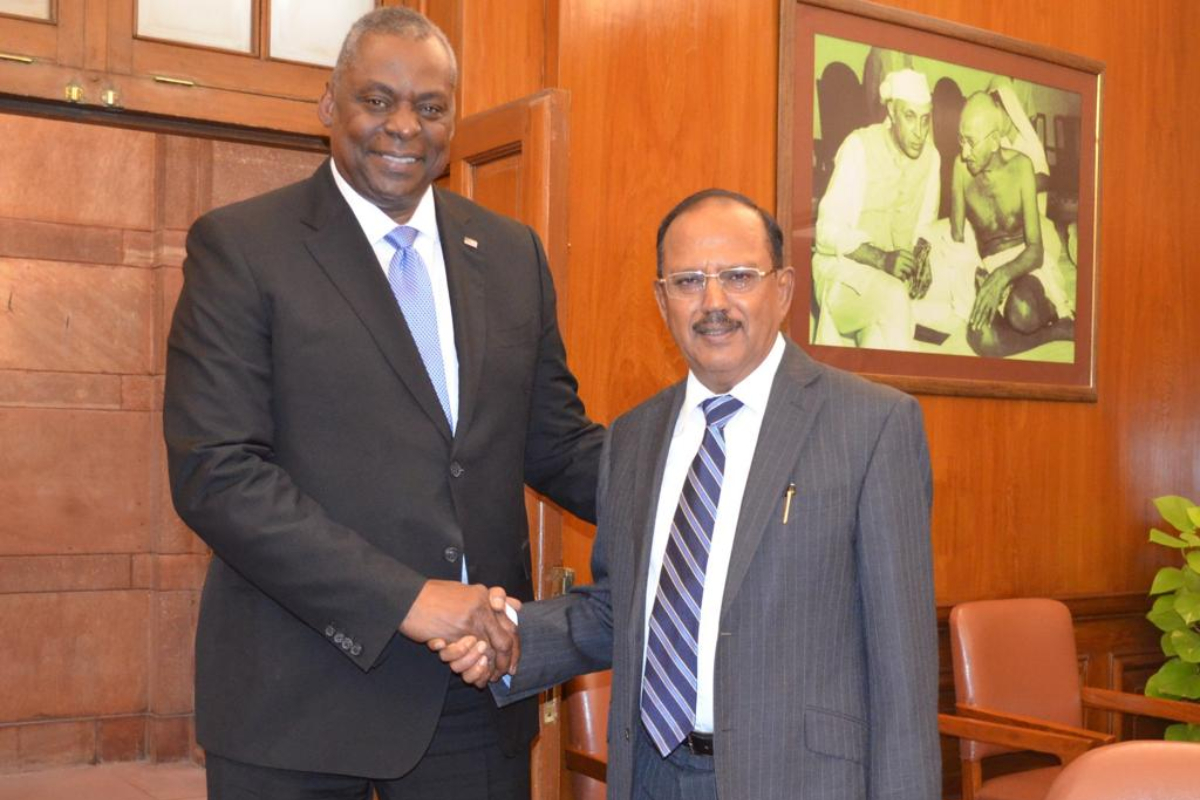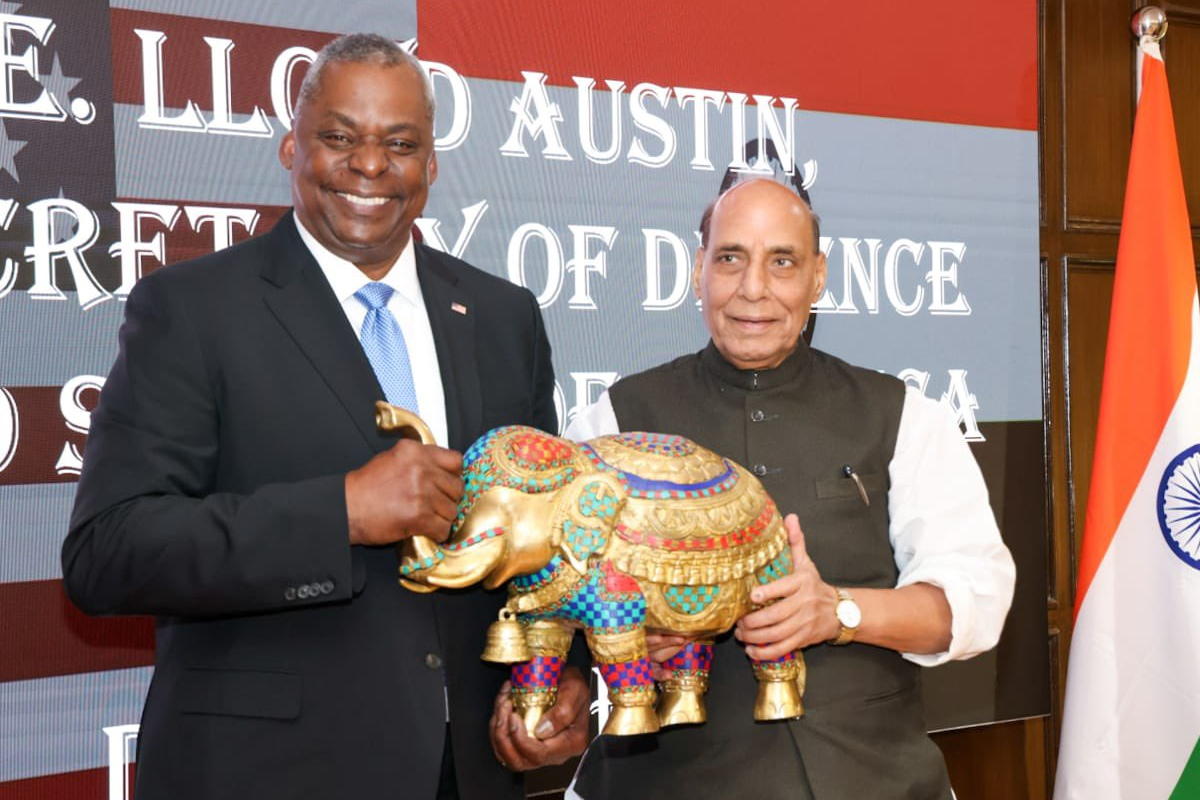NEW DELHI: US Secretary of Defence Lloyd J Austin III visited India on June 4-5 to bolster the major defence partnership and enhance collaboration in vital areas ahead of Prime Minister Narendra Modi’s official state visit to Washington.
During his visit, Secretary Austin held meetings with National Security Advisor Ajit Doval and Minister of Defence Rajnath Singh, focusing on regional security issues and reaffirming their commitment to a free and open Indo-Pacific.
A significant development during the discussions was the announcement of a new roadmap for US-India Defence Industrial Cooperation, which garnered a warm welcome from Secretary Austin and Defence minister Singh.
The roadmap aims to expedite technology cooperation and co-production in key sectors such as air combat, land mobility systems, intelligence, surveillance, and reconnaissance, munitions, and the undersea domain.
ALSO READ: Republican nominee wants ‘major concession’ for Russia to end Ukraine war
This initiative seeks to redefine the cooperation framework between the defence sectors of the United States and India, offering specific proposals to provide India with access to cutting-edge technologies and support its defence modernization plans.
Furthermore, the leaders pledged to review regulatory obstacles hindering closer industry-to-industry cooperation and to commence negotiations on a Security of Supply Arrangement and a Reciprocal Defence Procurement Agreement, promoting long-term stability in the supply chain.
In addition to industrial cooperation, Secretary Austin and his counterparts discussed the growing importance of defence innovation and collaboration in emerging domains such as space, cyberspace, and artificial intelligence.
ALSO READ: Pakistan scribe publicly tells authorities to quit Kashmir
They lauded the recent launch of the Advanced Domains Defence Dialogue, demonstrating their commitment to expanding the scope of bilateral defence cooperation to encompass all domains.
The establishment of the India-US Defence Acceleration Ecosystem (INDUS-X) was also welcomed. This new initiative, scheduled for launch by the US-India Business Council on June 21, aims to facilitate cutting-edge technology cooperation by fostering innovative partnerships among American and Indian companies, investors, start-up accelerators, and academic research institutions, complementing existing government-to-government collaboration.
Recognising India’s pivotal role as a security provider in the Indo-Pacific region, Secretary Austin and Defence minister Singh pledged to enhance operational collaboration across all military services.
ALSO READ: What if India joined Western Bloc? Exploring Cold War geopolitics
They explored opportunities for strengthening information sharing and deepening cooperation in the maritime domain. Secretary Austin commended India’s leadership role in the Quad Indo-Pacific Maritime Domain Awareness Initiative (IPMDA), which aims to equip countries across the Indo-Pacific with advanced domain awareness capabilities.

During his meeting with National Security Advisor Ajit Doval, Secretary Austin engaged in discussions on regional and global security issues of mutual concern, including maritime security in the Indian Ocean region.
He welcomed Doval’s perspectives on shared security interests and objectives, particularly emphasising the importance of increased maritime collaboration.
Both leaders emphasised the importance of cooperation in specific niche technologies to bolster capabilities in these critical sectors. They underscored the need for greater technology transfer, co-production, and the development of indigenous capacities in alignment with India’s flagship initiatives, “Make in India” and “Aatmanirbhar Bharat.”
ALSO READ: Unravelling jihad factor: India’s hypothetical role as Cold War ally of US
One significant highlight of the meeting was the shared commitment to ensuring the freedom of action for countries in different regions, including the Middle East, South Asia, Southeast Asia, and the Indo-Pacific. They emphasised the importance of respecting national priorities and avoiding any coercion that may lead to unfavourable decisions.
Trusted sources of supply, resilient supply chains, and fostering industry-to-industry partnerships emerged as key focal points during the discussion.
Recognising the significance of secure and reliable supply chains, the leaders highlighted the need to identify and collaborate with reliable sources for defence-related procurement. This approach aims to ensure the smooth functioning of the supply chains and enhance mutual trust between the two nations.
Addressing global challenges, the leaders emphasised a strategic and comprehensive approach that involves the efforts of the entire government machinery. They highlighted the importance of people-to-people and societal relations in tackling global issues effectively.









